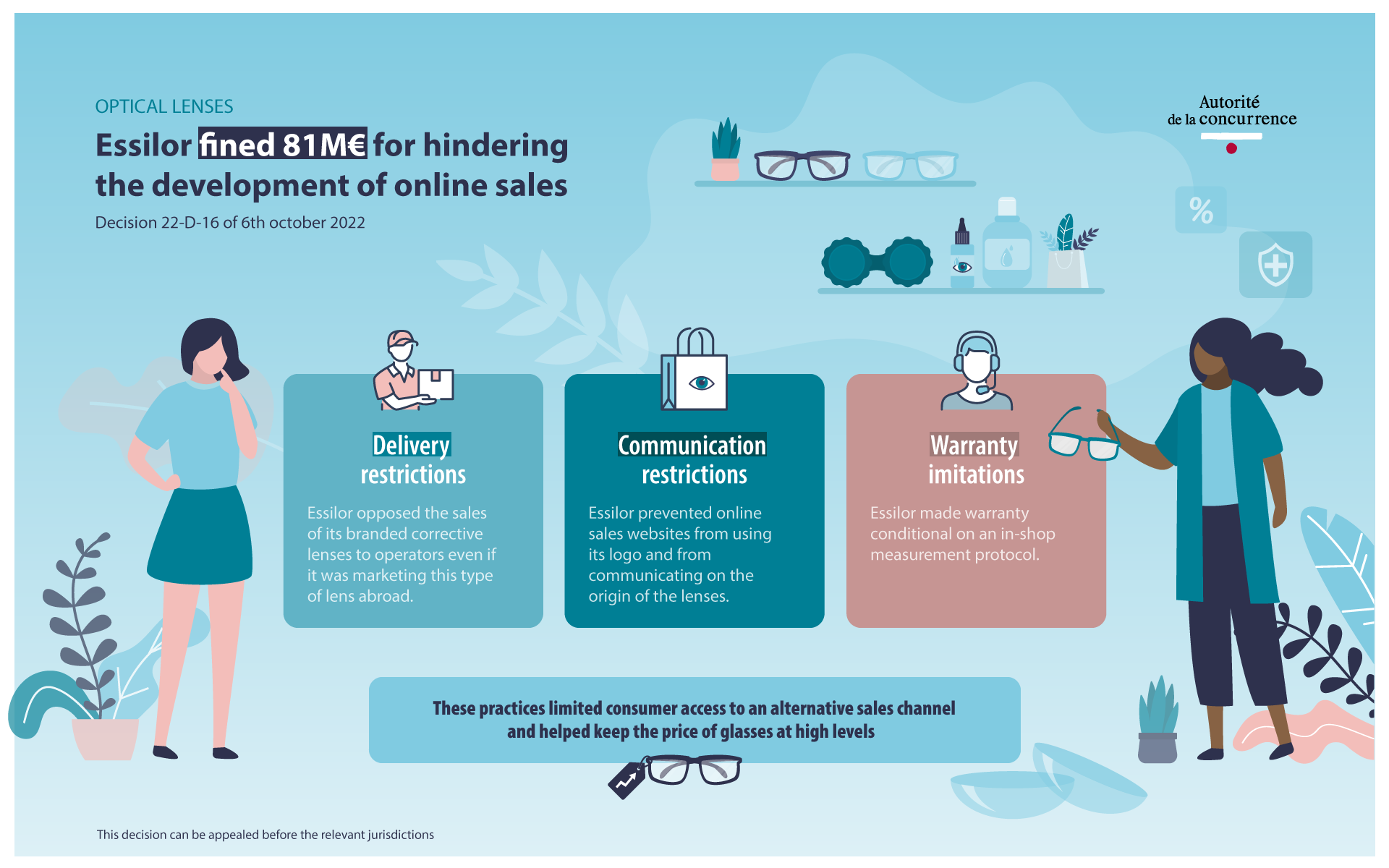Optical lenses sector: the Autorité de la concurrence hands out fines worth 81 067 400 euros to Essilor International SAS and its parent company EssilorLuxottica SA for discriminatory trade practices

Background
Following dawn raids, interviews and discussions with the main stakeholders in the optical lens industry, the Autorité de la concurrence handed out fines worth 81 067 400 euros to Essilor International SAS for having, over 11 years and 7 months, engaged in discriminatory trade practices aimed at hindering the development of the electronic commerce of corrective lenses in France. EssilorLuxottica SA, as the parent company, was fined 15 400 000 euros jointly and severally with Essilor International SAS.
EssilorInternational SAS. is a well-known stakeholder in the manufacture and wholesale distribution of optical lenses
Essilor International SA is the leading manufacturer and wholesale distributor of optical lenses in France. Essilor is dominant in the French market and also the world leader in the manufacture of corrective lenses.
Essilor International SA produces several types of lenses, categorised as "simple [1]" or "complex [2]".
In October 2018, Essilor International SAS became Essilor Luxottica, a new holding company that owns 100% of the Essilor International SAS companies - into which all the subsidiaries formerly owned by Essilor International SAS were transferred, along with Luxottica Group SpA (specialising in the manufacture and production of eyewear).
The corrective lens distribution market in France
The sector has undergone significant changes since the early 2000s, notably linked to the relaxation of regulations to encourage the development of the products’ online sales and bring down prices, which are higher than in neighbouring countries.
In France, the distribution of corrective lenses and optical glasses takes place via several channels:
- physical shops
- "pure players", i.e. via websites with no physical sales outlets
- "cross-channel" retailers, i.e. operators with both physical sales outlets and websites. Some retailers in this category require the consumer to visit a physical shop prior to purchase, while others allow the entire purchase to take place online. This is a "mixed offer".
Faced with the rise of online sales, a channel in which it did not have a presence in France, Essilor implemented discriminatory practices from 29 April 2009 to 23 December 2020 to hinder the development of this distribution channel.

Essilor imposed restrictions on electronic commerce operators in terms of deliveries, communication and warranties
The Autorité first found that Essilor was dominant in the French market for the wholesale distribution of corrective lenses, given its large and stable market share, the density and reliability of its distribution network, its presence at all levels of the industry's value chain and the absence of countervailing demand.
It also considered that Essilor had abused its dominant position by implementing a discriminatory commercial policy aimed at hindering the development of online sales websites in France, primarily those offering a mixed or fully online offer, such as Sensee, Happyview and DirectOptic.
-
Restrictions on deliveries of Essilor branded lenses, communication on the origin of the lenses and use of Essilor branded trademarks and logos.
To prevent online sales websites from offering Essilor or Varilux branded lenses to consumers, the strategy developed by Essilor as early as 2009 involved not only refusing to deliver branded lenses to them but also prohibiting them from using Essilor's trademarks and logos and from communicating the origin of the lenses.
During the investigation, Essilor did not provide any evidence that these restrictions were justified by the alleged differences, particularly in terms of the reliability of measurements, between opticians operating in physical shops and those operating online. On the other hand, the Autorité noted that these restrictions met the very strong protectionist expectations of physical opticians with respect to the Essilor Group. Unlike online sites, these opticians could, in fact, be authorised to use the Essilor logo if they complied with clear and objective rules. The Autorité also noted that, while opposing the online sales of corrective lenses in France, Essilor was marketing this type of lens abroad at the same time, both on its own sites and on third-party sites.
-
Warranty limitation
Essilor also implemented warranty limitations on online sales operators. Essilor indicated in its general terms of sale that its assumption of responsibility for the adaptation warranty was conditional on the retailer's compliance with a measurement protocol designed exclusively for in-shop sales. The Autorité noted that in the event of non-compliance with this protocol, the replacement of lenses was the sole responsibility of the retailer, which in practice only penalised electronic commerce sites.
Practices that limited consumer access to an alternative sales channel and kept prices high
In the Autorité's view, these practices, which occurred in a public health sector characterised by high prices, have a certain degree of seriousness.
While online sales sites offer a high degree of competitiveness in terms of price and fulfil the wishes of public authorities to encourage a marketing method that is conducive to lower prices, Essilor’s discriminatory trade practices may have helped to keep the price of glasses at high and rising levels during the infringement period.
They also contributed to limiting consumer choice and information, even though, as the Autorité noted, access to Essilor's products and communication on this point was a crucial challenge in terms of credibility for the emerging online sales channel, given the unrivalled reputation of these products.
The sanctions imposed
In light of all these elements, and also taking into consideration the particularly lengthy period of the infringement - 11 years and 7 months - and the fact that Essilor International SAS is part of a global group that is the leader in its field, the Autorité de la concurrence has fined Essilor International SAS. 81 067 400 euros for discriminatory trade practices (of which 15 400 000 euros are to be paid jointly and severally with EssilorLuxottica SA, its parent company).
[1] Simple lenses are lenses that do not require adjustments.
[2] Complex lenses include several types of lenses "that need a measurement protocol that requires at least measurements of the pupil height and distance".
Decision 22-D-16 of 6 October 2022
Contact(s)
